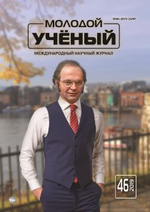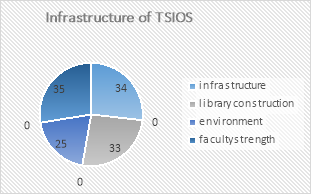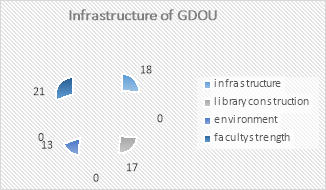This research paper was conducted to evaluate issues about the comparison of training mode of graduate students between two countries Uzbekistan and China and took Tashkent State University of Oriental Studies (TSIOS) and Guangdong Ocean University (GDOU) as examples. Data were collected through method of questionnaire, which was collected from the graduate students of these two universities. The data collected were analyzed, using the simple percentage and Excel program. The results revealed the comparison of training objectives, university curriculum, teaching methods, examination means, award dynamics, and infrastructure of both countries. Because all these aspects are impact on the cultivation of postgraduate students. Therefore, relate on this research, it was found out the problems and deficiencies in the cultivation model of postgraduate students in universities of both countries.
Keywords: Uzbekistan, China, cultivation, postgraduate students, talents, higher education.
Introduction
The training of postgraduate students in universities plays a crucial role not only in economic and social development, but also in schools’ and in personal development. Both Uzbekistan and China are developed countries with long life history; both countries made so many reforms in educational system and nowadays choose their own way in educational system. As a basic mission and essential requirement of higher education in Uzbekistan and China, cultivation of postgraduate students is a primary criterion for measuring the quality of higher education. Uzbekistan and Chinese’s universities are the main training base for postgraduates in both countries, playing a critical role in the growth of their theoretical knowledge, mental abilities, practical skills, innovative and critical thinking [20].
With the continuous development of society and economy, we ushered in the era of knowledge economy, and innovation has become the core of the era of knowledge-based economy. Only well educated students can be invincible in the fierce competition, build an innovative country and improve the overall national strength of a country. Because of the background and basic conditions of the popularization of higher education in Uzbekistan and China [22], the quality of cultivating postgraduate students is worrying. Universities are the main position of cultivation postgraduate students, while classroom teaching, the quality of teaching staff, the quality of teaching process, the educational practice and universities is the main channel to cultivate students. Students learn and develop through classroom teaching activities, school curriculum, school environment, school equipment, teaching staff, teaching methods and involving students in practice works. All these aspects directly affect the level of cultivation. Therefore, the objective of the present study will be adopting the method of questionnaire to investigate and improve the model of postgraduate cultivation in universities of Uzbekistan- Tashkent State Institute of Oriental Studies (TSIOS) and China Guangdong Ocean University- (GDOU). After analyzing the existing problems of postgraduate cultivation in both countries in depth, this paper will put forward analyzes the main tasks of the main goal of cultivation, types of cultivation, school curriculum, quality of teachers’ methods, professional practice, external collaboration and involving students in process of study.
Research method
This research paper takes the training mode of postgraduate students as the research object and TSIOS and GDOU as the sampling points. In order to understand the basic situation of training mode and the influencing factors of talents training behavior, data collection and situation investigation are carried out. Through the method of questionnaire, this paper makes an on-the-spot investigation on the training mode of postgraduate students of universities of the two countries, and analyzes the problems existing in the training mode in universities of the two countries, using the simple percentage and Excel program.
The meaning of postgraduate mode
There are different opinions on what is the «postgraduate training mode”, and there is no unified concept. According to Professor Dong Zefang [1], the postgraduate training mode refers to a relatively stable theoretical model and operation mode, which is composed of several elements and has some typical characteristics according to the laws and social needs of postgraduate training under the guidance of certain graduate education thoughts and training concepts. Its elements include training subject, training object and training concept. Methods, training conditions and training evaluation. According to Professor Cheng Sihui [2], the mode of postgraduate training is based on the laws of the growth of high-level talents and the needs of the society. According to Professor K. Sh. Baymirov [25], the postgraduate training mode is the cultivation of mental ability, developing theoretical and practical process of students. Other scholars believe that the postgraduate training mode refers to the knowledge, ability, quality structure constructed for the educated and the overall operation mode of realizing this structure in accordance with the law of talent growth and social needs. It reflects the optimal design of each link in the training process and the best combination of various factors, defines the general characteristics and era characteristics of talents, and embodies certain educational thoughts and concepts. The training mode is dynamic, systematic and benchmarking in practice.
Comparison and analysis of postgraduate training models between Uzbekistan and China
Comparison of training objectives
The goal of postgraduate training refers to the basic requirements and standards of knowledge, ability and quality structure to be achieved by the postgraduate through training activities. It answers the question of «what kind of graduate students should be trained”. It is the starting point and destination of the whole training activities and has a guiding role.
The graduate training in Uzbekistan is generally related to the degree system, which can be divided into two levels: Master's degree (not less than 2 years) and doctor's degree (not more than 3–5 years). Uzbekistan graduate education specializes in professional degree. The main training objective of professional degree graduate students is to cultivate high-level professional talents who can play a role in many aspects in the society. Its training focuses on teaching links, emphasizing students' practical ability and the ability to solve practical problems.
Graduate education in China is divided into two levels: Master's (2–3 years, not more than 5 years) and doctor's (3–6 years). According to the regulations of academic places of the People's Republic of China, the requirements for Postgraduates in China are: «Mastering solid basic theories and systematic expertise in this discipline. Have the ability to engage in scientific research or take up specialized technical work independently ". In recent years, China has also started to divide degree types into academic type and professional type, with different training objectives. The former aims to cultivate academic talents, while the latter aims to cultivate applied talents.
Through the analyzing data of TSIOS and GDOU the main goal of training mode for postgraduate students is the requirements of future work needs. It is shown in Table 1.
Table 1
Comparison of training objective in both countries
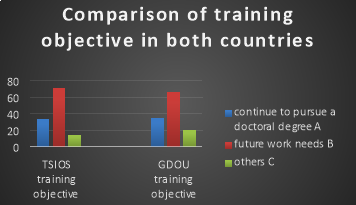
Comparison of curriculum
Curriculum is the basic way to achieve the goal of talent training. Whether the curriculum is reasonable or not is directly related to the realization of the goal of talent training.
According to Uzbekistan's higher education in accordance with its «Education Law” and the national talent training plan, curriculum is the core of talent training and the focus of innovative talent training. In Uzbekistan, the courses are divided into two categories: public compulsory courses and professional compulsory courses. Compulsory postgraduate courses in public subjects include courses on presidential work, research methods, English and national independence. Compulsory professional courses include basic courses and professional courses, which reflect the most important basic theories and professional knowledge of the subject according to the secondary subjects, including the subjects chosen by students.
China's postgraduate training curriculum system has been initially formed, which is divided into degree courses and non-degree courses. There are two kinds of degree courses: public compulsory courses and professional compulsory courses. Public compulsory courses for postgraduates include political theory, public foreign language and professional foreign language, and some subjects also offer mathematical statistics and other courses. Professional compulsory courses include professional basic courses and professional courses, which reflect the most important basic theories and professional knowledge of the subject according to the secondary subjects. Non degree courses belong to elective courses, specifically for graduate students of different majors and directions, the determination of graduate elective courses is generally conducted under the guidance of tutors, basically including public compulsory courses, professional basic courses, professional compulsory courses and professional elective courses. It can be seen that the setup of graduate curriculum system in country reflects the characteristics of distinct blocks.
In comparison of analyzing curriculum of both countries, we can understand that the curriculum scope of graduate education is relatively narrow, the curriculum structure is not reasonable, the learning of basic theory and related courses is not paid enough attention, and there are just few interdisciplinary courses. Additionally, due to the lack of sufficient preparation for learning, the lack of interaction between teachers and students, passive listening to teachers in class, the lack of active thinking learning habits, and learning methods similar to seminars are often formalized. Based on the analysis, despite all negative points, it can be revealed that students of Uzbekistan and students of China are relatively satisfied with their curriculum. Table 2 -3
Table 2–3
Course settings
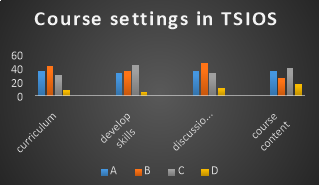
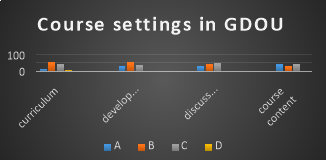
Comparison of teaching methods
Teaching method is the general name of the behavior that teachers and students adopt in the teaching activities in order to achieve the teaching purpose and task requirements.
As we can see from analyzing (table 4) in Uzbekistan most of the teachers use “interactive and traditional methods” of teaching, they impart their knowledge and skills from books with using interactive equipment. It is a kind of teaching form dominated by teachers. Students are lack of interaction with teachers in the classroom. In China the most of the existing teaching methods belong to «traditional teaching» and «guided teaching», which is a teaching form dominated by teachers. Students have insufficient interaction with teachers in the classroom. The use of the comprehensive teaching mode of combining theory and practice is more conducive to improving the quality of postgraduate training. So, from this aspect two countries have lack of teaching method (which should normally include both theory and practice). This part needs great progress.
Table 4
Comparison of teaching methods
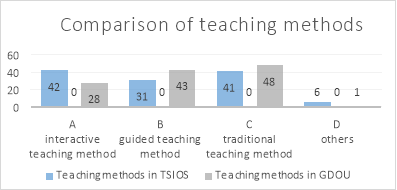
Comparison of examination means
Based on the comparative study, this paragraph discusses the main means of examination of graduate students in the institutes of the two countries. It was divided as follows: assessment methods, assessment difficulty, assessment times and assessment proportion. In Uzbekistan examination paper is the main way of course assessment, the proportion of practical operation is relatively low, and the existing course assessment methods are relatively unified. For most postgraduates, the assessment is more difficult. Most courses use «half semester / one time» and «one month /one time» assessment times. In terms of curriculum assessment, assessment accounts for a high proportion, which is basically maintained at about 40 % — 60 %. In comparison, in China there are both course paper and examination paper are the main means of examination. The current assessment is less difficult for most postgraduates. Most courses use «one semester /one time» assessment times. In terms of curriculum assessment, assessment accounts for a relatively high proportion, which is basically maintained at more than 60 %. It is noticeable that in this part of the comparison, Uzbekistan and China have a big difference. Table 5–6
Table 5–6
Examination means in TSIOS and GDOU
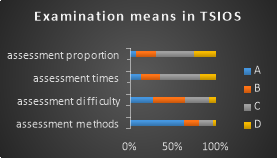
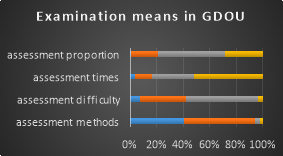
Comparison of award dynamics
In the research analysis, the dynamics of awarding are considered from four sides, such as: award dynamics, award setting, award difficulty and incentive mode. In Uzbekistan most graduate students think that the school's reward system is relatively large. Furthermore, half of the graduate students consider that the setting of the award and assistance is «relatively balanced”, and the other half of the students think that the setting of the award and assistance is «generally balanced». It can be seen that most graduate students think that it is «relatively difficult» and «generally difficult» to get awards, while few graduate students think that it is easy to get awards. So graduate students must study hard and improve their skills training. Now, many graduate students prefer spiritual rewards, followed by material incentives. In addition, we can see that many graduate students choose «comprehensive rewards”. This choice helps graduate students develop in spirit and ensure their financial security, which provides a dual motivation for good learning. In China, most graduate students think that the school rewards are relatively strong, and the setting of awards is more balanced. Also, it is easier and less difficult to obtain awards in Chinese universities. The existing incentive forms are quite diverse, and comprehensive rewards are adopted, including material rewards and spiritual rewards. Table 7-8
Table 7–8
Comparison award dynamics
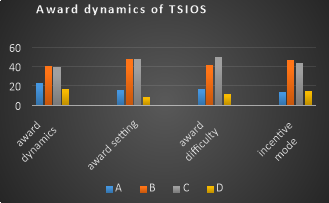
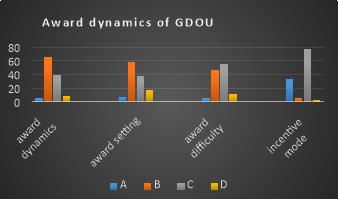
Comparison of infrastructure
School atmosphere and living environment play a vital role in training of students. That is why this meaning also was included in the list of cultivating postgraduate students. From prospective of graduate students of Uzbekistan and China, the most quantity of students are basically satisfied with infrastructure, especially with library construction, living environment and faculty strength. Nowadays government of both countries pay so much attention for good living and learning environment, and modern class equipment. Table 9-10.
Table 9–10
Comparison infrastructure
|
|
|
Conclusion
In conclusion, we can conduct the following broad analysis to show which factors affect the cultivation of postgraduates of TSIOS and GDOU universities: First, in terms of postgraduate study, undergraduates have a clear understanding of the master's program after graduation. They clearly state their positions and understand the purpose of their study, that is, future work or doctoral degree. Postgraduates realize the importance of learning and training, through which their acquired skills and creativity will be raised to a new level. The training of postgraduates is one of the tasks faced by the university to make the curriculum correctly, which not only affects the development of their own skills, but also affects the overall innovative thinking of postgraduates. It can be seen from the survey that postgraduates are generally satisfied with the university curriculum. In terms of teaching methods, although the interactive teaching methods are gradually developed, the traditional teaching methods still occupy a dominant position in schools. However, the traditional theory teaching method reduces the interaction of students in the classroom. The reason why interactive teaching method is good is that it makes graduate students more interested in a specific subject, and teachers use interactive teaching method, which is more conducive to attract students' attention. At the same time, graduate students do not have enough practical activities, which will not be conducive to graduate students get good work. Generally speaking, the best teaching method is the combination of theory and practice. With the help of the combination of theory and practice, it can effectively improve the quality of graduate education and improve the interest of graduate students in team cooperation, which helps them develop their communication ability and acquire and master new information. Second, in terms of postgraduate training mechanism, the way, frequency and strength of assessment mechanism will have a great impact on postgraduate training. Diversified assessment mechanism and appropriate assessment period can really assess the training effect and realize the role of assessment mechanism. For example, the way of assessment system is mainly test. For most postgraduates, the examination papers are not well evaluated. Third, the incentive system emphasizes the full play of the role of material and spiritual incentives. In the incentive mechanism of graduate training, there should be both material and spiritual incentives. Many graduate students prefer spiritual incentives, followed by material incentives. We can also see that many graduate students choose «comprehensive incentives”, which is conducive to the spiritual development of graduate students and ensure that they are self-motivated Our financial security provides a double impetus for good learning. At the same time of increasing incentive methods, we should also pay attention to the balance of incentive settings; supporting mechanisms provide facilities and equipment for graduate training, school office construction, laboratory construction, library construction, dormitory living environment and other external conditions for graduate training, and perfect supporting facilities provide basic guarantee for graduate training.From the above, we can draw the following conclusions: there are advantages and disadvantages in the postgraduate training in TSIOS and GDOU universities; we need to make progress in this field; and we need to carefully design courses, high-quality teachers, group cooperation, comprehensive teaching methods, balance of assessment mechanism, balance of incentive settings, supporting facilities (classroom, library, dormitory living environment, etc.) all affect the postgraduate training Foster and contribute to the development of Postgraduates' ability, innovative thinking, rich spiritual world, ambition, etc. These graduate students are the future of our country. Our country needs such talents because they improve and develop the country in all areas of activity.
References:
- Chen Xinzhong, Dong Zefang. An analysis of the elements of postgraduate training model. Degree and graduate education, 2009, (11): 4–7.
- Cheng Sihui, Wang Chuanyi. Postgraduate training mode: reality and future.
- Li Shengbing. Reflection on the research of postgraduate training mode. Education research,2005, (11): 55–58.
- Chen Xuefei, et al. How to train doctors in the West -- the model of France, Britain, Germany and the United StatesAnd experience. Beijing: Educational Science Press, 2002: 2–5.
- Wang Jianmin. A preliminary study on the training system of dual mode master's degree [J]. Fudan EducationForum, 2004, (3): 46–49.
- Feng Min, Yu Donghong.A comparative study of postgraduate training models between China and the United States, 2016, 4.
- Research on the Construction of the Quality Evaluation Model of Graduate Thesis Based on Evidence Theory [A]. Yan Li.Proceedings of 2016 International Conference on Modeling, Simulation and Optimization Technologies and Applications(MSOTA 2016) [C]. 2016
- The Factor Analysis of Training Mode about Master Graduate Students [A]. Zhongwen Liu,Pengzhao Gao.Proceedings of 2012 International Conference on Education Reform and Management Innovation(ERMI 2012) Volume 2 [C]. 2012
- Cooperative Education Mode for Graduate Students Cultivation: Exploration and Practice in NJUPT [A]. J. H. Shen,F.Li,L.Zhou,C. H. Cheng,L. X. Yang,S.Zhao.Proceedings of 2015 International Conference on Computer Science and Environmental Engineering(CSEE 2015) [C]. 2015
- A Study on Connotative Development of Local Agricultural Colleges and Universities [A]. Lin Lin.Proceedings of 2017 the 3rd International Symposium on Social Science(ISSS 2017) [C]. 2017
- Practicing and Thinking of International Graduate Education by “World-class Universities and World-class Disciplines Construction” in Beijing University of Technology [A]. Wen Gu, Yufan Sun, Dengmei Ji, Jie Wu, Lifang Wu. Advances in Social Science, Education and Humanities Research, Volume 72 [C]. 2017
- Adverse Selection Analysis in Graduates Enrollment in China [A]. Jun Guan.Proceedings of 2013 International Conference on Education and Teaching (ICET 2013) Volume 21 [C]. 2013
- Case Analysis and Cultivation Measures of Mining Engineering Postgraduates Who Are Cross Major [A]. Liu Shao-wei,Dong Shi-ju,Zhang wei-guang,Zheng xi-wang.Frontiers in Computer Education(ICFCE 2011 AISC 133) [C]. 2011
- A Graduate Cultivation and Management Pattern with the Support of New Informationization [A]. Yi Qu 1,Xueqing Li 1,Lixin Li 21.Software College,Shandong University,Jinan,250101,P.R.,China,2.JCC Office,School of Pharmacy,Shandong University,Jinan,250101,P.R.,China..Proceedings of 2008 IEEE International Symposium on IT in Medicine and Education(ITME 2008) [C]. 2008
- Zhu Xiaoman, H. E. Bolevskaya, B. Bolesinkov. 20th to 21st Century Comparison of Sino-Russian Education Reform [M]. Beijing: Education Science Press. 2016.
- Xie Anbang. Comparative Higher Education [M]. Guilin: Guangxi Normal University Press. 2010.
- Liu Haifeng. The dispute over the reform of the college entrance examination [J]. Principal's reading. 2016(1): 38–39.
- Yang Jianmei, Uzbekistan's reform of higher education is fruitful [J] Central Asia Information. 2017 (11): 1–2
- Karimov. Our main goal is to move decisively along the path of development, democratic renewal and modernization of the country. Report at the solemn meeting devoted to the 22ndanniversary of the adoption of the Constitution of the Republic of Uzbekistan, 2014, December7. — Tashkent, «Uzbekistan», 2014.
- Kobil Ruziev, Umar Burkhanov. Uzbekistan: Higher Education Reforms and the Changing Landscape Since Independence. 25 Years of Transformations of Higher Education Systems in Post-Soviet Countries. 2018. 435–459.
- Zhiqiang Lu, Bernard Fernandez, Tianchu Lu. Higher Education in Management: The Case of China. The Future of Management Education. 2017.23–58.
- Changli Yu and Hongchun Jia. (2009). On the Cultivation of Innovative Talents in Colleges and Universities. Journal of CCSE. 4–10.
- Leilei Tai, Zhongguo Lv, Shan Wang. (2017). Study on Construction of Innovative Talent
- Cultivation Model in Colleges and Universities Based on Flipped Classroom. Revista de la Facultad de Ingeniería U. C. V., Vol. 32, N°14, pp. 435–442.
- K. Sh. Baymirov. (2015). Modernization of the education system in Uzbekistan: experience, results and prospect. 177–182
- Discussion on the Cultivation of College Students’’Innovative Personalities. Wei Qiaoyan. Journal of higher education. 2003
- Analysis on the Environment Factors in Influencing the Release of Postgraduate Students’’Innovation Potential. Qin Rui,Ding Songbin. China Higher Education Research. 2006
- To Launch Collaborative Innovation and Improve the Quality of Education--an Interview for Gong Ke,President of Nankai University. Zhang Nanxing,Wang Chunchun. Journal of University. 2012
- Chen GX, Yu AZ (2011) Primary exploration of improving the quality of postgraduates’ cultivation in local university. High Educ Forum 6:100–103
- Li J, Pan SZ, Su L (2011) A study on the relationship between university tutor and graduate student: a literature review. J Educ Sci Hunan Normal Univ 10(4):77–80
- Zou SL, Zhang C (2011) Research on the cultivation of the innovative ability of the master graduate students of management science and engineer. J Univ South China (Social Sci Ed) 12(1):65–68
- Li P, Mei LH (2010) Comparison of postgraduate education models in china and overseas. J Guangzhou City Polytech 4(3):76–80
- Chen Zhili. Speech at the 22nd Meeting of the Academic Degrees Committee of the State Council [J]. Degree and graduate education, 2006, (3): 38.
- Lu Dongmei. Study on the application of factor analysis in physical fitness test [D]. Jilin: Northeast Normal University, 2012:23.
- Wu Minglong. SPSS statistical application practice. Beijing: Beijing Railway Publishing Society, 2001:68.
- Chen Ping. On the system of tutor responsibility and the cultivation of graduate students' academic quality Graduate education, 2007, (1): 34.






